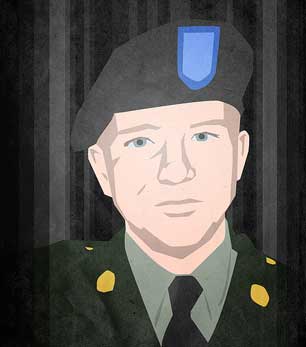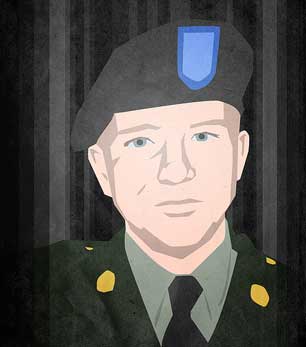 Bradley Manning. (Image: Jared Rodriguez / Truthout)Washington – Amid secrecy and spectacle, the long-awaited court-martial trial of WikiLeaks linchpin Bradley E. Manning starts Monday.
Bradley Manning. (Image: Jared Rodriguez / Truthout)Washington – Amid secrecy and spectacle, the long-awaited court-martial trial of WikiLeaks linchpin Bradley E. Manning starts Monday.
The Army private first class already knows he’s going to prison, having previously pled guilty to 10 charges relating to the disclosure of hundreds of thousands of government documents. Now, in a tightly guarded military courtroom at Fort George G. Meade in Maryland, Manning will face more serious charges including aiding the enemy.
If convicted on the remaining charges, the slightly built, 25-year-old Manning could spend the rest of his life in the U.S. Disciplinary Barracks at Fort Leavenworth. Whatever happens, the former intelligence analyst’s trial has already incited tough questions about military justice, the public’s right to know and the price that’s paid by a self-styled whistleblower.
“I believed that if the public, especially the American public, had access to the information…this could spark a domestic debate on the role of the military and our foreign policy in general, as well as it related to Iraq and Afghanistan,” Manning explained in court on Feb. 28.
In what’s been described as the largest leak of government documents in U.S. history, Manning acknowledges turning over to WikiLeaks some 250,000 State Department cables and half-a-million Army documents. WikiLeaks then published the documents online, as a major part of a broader campaign to disclose government actions.
Army prosecutors say the massive document dump endangered U.S. national security and put lives at risk.
“Pfc. Manning was trained and trusted to provide intelligence,” Army Capt. Ashden Fein said during an earlier hearing, a transcript shows, adding that “he used that training to defy our trust, to systematically and indiscriminately harm the United States during a time of war and while deployed.”
Prosecutors, for instance, have indicated they will present forensic evidence that WikiLeaks material was viewed by the late al Qaida leader Osama bin Ladin.
An estimated 150 witnesses are expected to testify during the trial, which Manning and his civilian attorney, retired Army officer David Coombs, have chosen to be held before a judge alone instead of a military panel. The trial is expected to last about three months.
To secure a conviction, prosecutors must prove that Manning knew the documents he provided WikiLeaks would be seen by al Qaida members or other enemies of the United States. Under Article 104 of the Uniform Code of Military Justice, someone can be convicted for aiding the enemy by conveying intelligence “by direct or indirect means.”
When it comes to communicating with the enemy, Article 104 adds, the “intent, content and method of communication are immaterial.”
The military crime carries the potential for a death sentence, though prosecutors have already said they won’t ask that it be applied to Manning if he is convicted.
Manning says he acted out of exemplary motives.
The State Department cables, Manning declared in his nearly 35-page Feb. 28 statement, “documented backdoor deals and seemingly criminal activity,” while he said Army materials revealed the “seemingly delightful bloodlust” of soldiers who were “congratulating each other on the ability to kill in large numbers.”
One classified Army video that Manning passed to WikiLeaks showed an Apache helicopter gunship firing on Iraqis during an infamous July 2007 episode. Eleven Iraqis died in the attack.
“Oh yeah, look at those dead bastards,” one Apache crewman says, at one point.
“Nice,” the other crewman added.
Manning’s stated motives in leaking the documents, and the myriad, sometimes graphic details he revealed about U.S. diplomacy and war-fighting, have made the Oklahoma native a hero to some. On Saturday afternoon, Pentagon Papers whistleblower Daniel Ellsberg and others affiliated with the Bradley Manning Support Network rallied at the Fort Meade main gate, outside of Washington.
“We are all Bradley Manning,” demonstrators chanted.
New Jersey-based activist Nathan Fuller added, in an interview, that the 1,000-plus demonstrators Saturday hoped “to send a clear message that we will not tolerate Bradley Manning’s unjust court martial, and to thank him for his invaluable contributions toward peace.”
The media also has taken an intense, and periodically frustrated, interest in the case that began publicly with Manning’s arrest in May 2010.
Some 350 journalists requested credentials from the U.S. Army Military District of Washington to cover the trial but only 70 credentials were issued. In an unusual twist, the Freedom of the Press Foundation raised $57,000 in hopes of paying for stenographers to provide a public transcript.
The judge, Army Col. Denise Lind, has already indicated that some of the trial testimony from 24 witnesses may be closed to prevent the release of classified information. Many trial documents likewise remain secret, prompting multiple lawsuits intended to compel greater disclosure, including one filed May 22 in federal court in Baltimore.
“The press and public are unable to engage in careful observation and analysis of the issues arising during what is arguably one of the most controversial, high-profile court-martials since the trial of Lt. William Calley for the My Lai Massacre in Vietnam,” attorneys for the Center for Constitutional Rights and other advocates wrote in a brief.
The U.S. Court of Appeals for the Armed Forces previously ruled in a 3-2 decision that it lacked the authority to order Lind to grant more public access.
Underscoring how secrets and surprises have become the recurring motif of Manning proceedings, an Army Freedom of Information Act Electronic Reading Room section created for court martial documents that have been cleared for publication turned blank on Saturday, two days before trial.
